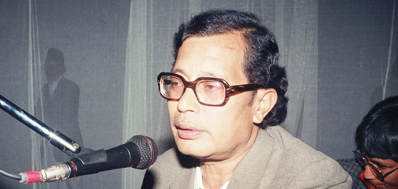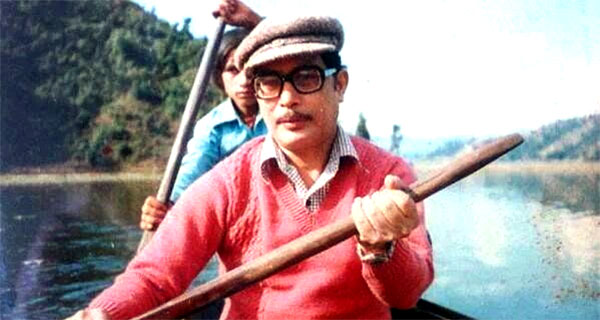Ask any Nepali, millennial or older, to name five of their favorite Nepali songs and at least one of them will be by Narayan Gopal. Listen to a group of friends singing Nepali songs at a party, a picnic or a social gathering and you’ll no doubt hear at least one Narayan Gopal song. Tune into any Nepali radio station, any day, and you are bound to meet the soothing voice of Nepal’s Swor Samrat (“Emperor of Voice”).
Even three decades after his untimely demise at the age of 51, Narayan Gopal Guruwacharya’s voice resonates with Nepali households and his songs are among the most played in the music industry. Also recognized as the “King of Tragedy” for his melancholic songs, Narayan Gopal’s three-decade-long musical career (1960 to 1990) saw him reign over the Nepali music industry and set a bar, which his followers argue can never be reached.
ApEx talked to many musicians and music enthusiasts who gave their own reasons behind why Narayan Gopal is the king of Nepali music—a king who can never be dethroned. The list of his evergreen songs and the highest awards and recognitions he received also keep his rich legacy alive.
But what if the Narayan Gopal we know never existed? What would be of the modern Nepali music (adunik sangeet) without the golden voice of the Swor Samrat?
“Without Narayan Gopal, the modern Nepali music would not have reached the same height,” says Bhupendra Man Shakya, a 67-year-old engineer and musician. “To be fair, there were other talented singers at the time including the recently departed Prem Dhoj Pradhan, as well as Bhakta Raj Acharya, but Narayan dai’s voice has its own charm.”
Shakya, who shared the neighborhood of Kilagal with Narayan Gopal and is friends with his younger brothers, calls the singer his “indirect guru.” A music enthusiast who has also recorded and released his own music, Shakya has put up a number of Narayan Gopal covers on his YouTube channel. “I grew up following Narayan dai and trying to copy him. That’s how I learned music,” Shakya says. “I can’t imagine his not being there in the industry. His contributions to Nepali music are unmatched. He raised the standards for everyone.”

Veteran musician Deepak Jangam who composed music for Narayan Gopal in the latter part of the singer’s career—producing hits like “Euta Manche Ko” and “Timilai Ma Ke Bhanu”—also credits him for lifting the Nepali music industry as a whole. The modern Nepali music rested completely on Narayan Gopal’s shoulders, he reckons, and took it to unprecedented heights, so high that singers even to this day are building prosperous careers in his shadow.
“In terms of volume, the number of Narayan Gopal’s songs that became hits is higher than the hits of any other singer in the Nepali music industry,” says Jangam. “He was selective in choosing who to work with and all his songs are lyrically and musically sound and weighty. They have the richness that is hard to replicate.”
In his career as a singer and music composer, Narayan Gopal collaborated with a very limited number of people. He was known to work in a closed circle with musicians Gopal Yonzon and Dibya Khaling and lyricists Bhupi Sherchan and Ishwar Ballav among his contemporaries. Narayan Gopal’s body of work also features Nepali movie songs like “Mohani Lagla Hai”, a duet he sang with India’s first-ever Grammy-nominated singer Asha Bhosle.
“Narayan dai had a strong artistic temperament and it was not very easy to work with him,” says Jangam, recalling the time he was roped in by the Royal Palace to compose the music of “Euta Manche Ko”, the lyrics of which was written by the late Queen Aishwarya under her pen name Chandani Shah. In the mid-80s, Jangam was already under pressure to work for then powerful Royal Palace, which usually roped in musicians from either Radio Nepal or the Royal Nepal Academy. Jangam was the only outsider approached to compose for the Queen’s lyrics. “I made a total of 28 different tunes for the song before Narayan Gopal selected one,” Jangam says. “He was nothing short of perfectionist. That’s why his songs are evergreen.”
The effects of Narayan Gopal’s absence from the music industry would be hard to calculate, says Jangam, but he is sure that the level of maturity of Nepali modern music would be far lower. “It’s not that there would be no progress in Nepali music, but the standards would probably be lower. The overall quality of music would have decreased.”
Narayan Gopal’s meticulousness and earnestness in music making raised the whole industry. His songs are engraved in our minds. “One way to judge the impact of Narayan Gopal in Nepali music is by questioning what came after him,” explains Jangam. “It’s been 31 years since his demise. That is three generations as far as the music industry is concerned.

Even after all these years, the fact that Narayan Gopal’s music still reigns supreme and not a single name has come close to replacing him suggests that his absence would have left a huge void in Nepali music. “Even though he left long ago, his songs still are benchmarks for new singers and musicians,” adds Jangam.
Singer and music educator Ajar Jangam, who is also the son of Deepak Jangam, reemphasizes Narayan Gopal’s irreplaceability. An accomplished singer with many national-level awards to his name, Ajar is also the recipient of the state-organized ‘Narayan Gopal Sangeet Purashkaar.’ Narayan Gopal being a huge inspiration for his music, Ajar is a regular performer at the annual ‘Narayan Gopal Smriti Diwas’ held at the late singer’s residence at Maharjagunj. “It is one of the biggest stages for singers of our genre and I have had the privilege of performing there regularly for the past 15 years,” says Ajar.
As a student of music-turned-educator, the PhD candidate in music has a slightly different opinion on the reasons behind Narayan Gopal’s success. It is not only his music, Ajar says, that captivated people’s minds. You also have to factor in the many controversies related to him as well as his untimely death. Along with that, the quality of music the selective singer produced makes him an immortal.
“If you look at other singers around his time, they have a maximum of five to six well recognized songs,” Ajar says. “In the case of Narayan Gopal, almost his entire discography consists of golden hits that people still remember.” It was the late singer’s hard work, dedication and work ethics that raised the bar for everyone. The peak he took modern music to, avers Ajar, would never have been scaled had he not been in the scene. “He was not just a master singer but was also very well-read and constantly kept educating himself,” Ajar says. “These are the reasons that make him one-of-a-kind. It is because of him that modern music got a big push in the initial stage and has now become one of the biggest genres in the industry. It would not have been possible without him.”
Singer Preeti Kaur has similar views. “There has been no one with vocal qualities and musical sense of Narayan Gopal,” Kaur says, also finding it difficult to answer the ‘what if’ question on Gopal’s absence. There would have been someone else, she says. But would the posterity remember that person in the same way, she doesn’t know? As for the title of ‘Swor Samrat’, Kaur would nominate singer Bacchu Kailash for it, while still admitting that the audience have always been closer and more emotionally attached to Narayan Gopal’s songs.
Street smarts
Surendra Bahadur Singh, 58
We would have been deprived of one of the most dedicated singers to grace the Nepali music industry.
Janaki Silwal, 52
Prem Dhoj Pradhan would have gotten more attention. But he wouldn’t have received the title of Swor Samrat. That belongs only to Narayan Gopal.
Krishna Prasad Kafle, 39
I don't think any other singer would get the title of 'Swor Samrat'. He got all the plaudits because of his hard work and dedication. The Nepali music industry would not be the same.
Madhu Adhikari, 36
We wouldn’t have had a singer who was equally loved by children, adults and elderlies alike.
Rakesh Yadav, 28
We wouldn’t have Ram Krishna Dhakal who grew up singing Narayan Gopal’s songs and modeled his singing style after him. Without Narayan Gopal, we would have no voice for the late composer Gopal Yonjan, who gave a glut of music to our industry. Also Radio Nepal wouldn’t have been as widely heard without his voice.
Pranaya Shrestha, 28
If he didn’t exist, we would never know the beautiful songs that lift you up during tough times. Also, were it not for him, very few would listen to old songs.
Kelvin Malakar, 27
Narayan Gopal is to Nepali music industry what The Beatles are to world music. He’s inspired countless people to pick up music. Otherwise many of today’s famous Nepali singers wouldn’t even have taken music seriously.
Rozina Baral, 23
There probably wouldn’t be that one old Nepali song that everyone in every generation hums along.
Suprabha Bhusal, 23
I wouldn’t get a taste of real Nepali classical music. Narayan Gopal’s songs fascinated me and got me hooked to classical songs. He had that magic in his voice.
Samikshya Adhikari, 22
Our understanding of music would be incomplete without Narayan Gopal. He introduced music to youths. It’s not that there were no other great singers. But it was his music that got people listening to Nepali songs.
Susan Chaudhary, 21
If Narayan Gopal didn’t exist, the generation would have gotten another musical legend. No doubt his songs are hits but in his absence the music industry would still flourish. The music industry isn’t defined by an individual but is a collaborative effort. However, he did exist and we are forever thankful for his contribution.
Kartabya Regmi, 18
Without Narayan Gopal, we wouldn't get songs that transcend generational boundaries. Even someone from my generation can easily relate to his songs.












